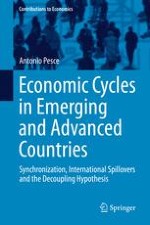2015 | OriginalPaper | Buchkapitel
4. International (Spillovers in) Macroeconomic-Credit Linkages and the Decoupling Phenomenon
verfasst von : Antonio Pesce
Erschienen in: Economic Cycles in Emerging and Advanced Countries
Aktivieren Sie unsere intelligente Suche, um passende Fachinhalte oder Patente zu finden.
Wählen Sie Textabschnitte aus um mit Künstlicher Intelligenz passenden Patente zu finden. powered by
Markieren Sie Textabschnitte, um KI-gestützt weitere passende Inhalte zu finden. powered by
